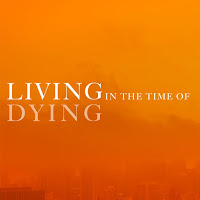With a title like that and with this as an opening
line you might expect this film to be full of despair, doom, and hopelessness.
But, it isn’t. It might be a stretch to say it is a joyful or happy film, yet
there are glimpses of such feelings throughout the film.
One overriding emotion that does frequently arise is
that of love.
Michael Shaw is an Australian filmmaker who, in order
to make this film, sold his house and spent most of 2019 researching and
interviewing four remarkable people for this film.
Catherine Ingram is a teacher of meditation and
Buddhism. It is her words and voice that begin the film. She is well known as
the author of Facing Extinction,1 originally written in 2019
and updated in 2021 during coronavirus.
Dahr Jamail is an American journalist who has received
awards for his writing about Iraq. However, it his book The End of Ice
that is the reason for Shaw’s interest in interviewing him.
Jem Bendell, best known for his 2018 paper Deep
Adaptation,2 is Professor of Sustainability at Cumbria
University. His paper has been downloaded more than one million times.
Stan Rushworth is a Cherokee elder and citizen of
Chiricahua Apache Nation – an honour Stan says that cannot be refused, nor can
it be requested – ‘it is a gift’ he says. He is the author of four books.
All four of these people bring a different, yet
complementary, perspective to the topics of, social/environmental collapse, climate
chaos, the 6th mass extinction, overshoot, and the time of dying.
Shaw’s primary purpose in interviewing these four
people, and in producing the film, is to attempt to answer the question; How do
we live in the knowledge that the planet (including humans) is dying?
Shaw asks this question in various ways. When asking
Stan Rushworth what traditional owners of the land could offer at this
time, Stan is quick to remind Shaw, and the films viewers, that the message indigenous
people have to offer is one they have ‘been saying…since Day One.’
Yet, westerners (colonisers of indigenous cultures)
have not listened. Dahr Jamail reiterates this when he says ‘it is all about
listening.’
This is a film about our values, about how we live
with each other and the more-than-human beings on this planet. It is not a film
about how much carbon is in the atmosphere or even about mitigation attempts.
There are only two graphs in the film and no numbers. As such, this is a film
that speaks more directly to our hearts than to our minds.
This film is less than an hour long. Spending an hour
watching and listening to this film will reward you in many ways. It is
available for free at https://www.livinginthetimeofdying.com/
Notes:
1. This essay is no longer available. As Catherine says
about it: “I
wrote the long-form essay “Facing Extinction” in early 2019. Over these
past years I have occasionally been able to update the information and
perspectives contained therein. However, I am finding that the speed with which
the data is changing and the pressing issues that we are immediately facing,
such as the exponential rise of artificial intelligence and transhumanism, have
made some of this essay obsolete. I have thus decided to remove it.”
There is, however, a
Youtube video of the author reading the original essay still available.
2. Deep Adaptation is available on Jem Bendell’s website - https://jembendell.com/ - either by using
the ‘Search” button or by scrolling to the bottom of his home page.

No comments:
Post a Comment
This blogsite is dedicated to positive dialoque and a respectful learning environment. Therefore, I retain the right to remove comments that are: profane, personal attacks, hateful, spam, offensive, irrelevant (off-topic) or detract in other ways from these principles.